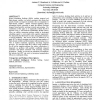Free Online Productivity Tools
i2Speak
i2Symbol
i2OCR
iTex2Img
iWeb2Print
iWeb2Shot
i2Type
iPdf2Split
iPdf2Merge
i2Bopomofo
i2Arabic
i2Style
i2Image
i2PDF
iLatex2Rtf
Sci2ools
ATAL
2009
Springer
2009
Springer
Evaluating hybrid constraint tightening for scheduling agents
Hybrid Scheduling Problems (HSPs) combine temporal and finite-domain variables via hybrid constraints that dictate that specific bounds on temporal constraints rely on assignments to finite-domain variables. Hybrid constraint tightening (HCT) reformulates hybrid constraints to apply the tightest consistent temporal bound possible, assisting in search space pruning. The contribution of this paper is to empirically evaluate the HCT approach using a state-of-the-art Satisfiability Modulo Theory solver on realistic, interesting problems related to developing scheduling agents to assist people with cognitive impairments. We demonstrate that HCT leads to orders of magnitude reduction of search complexity. The success of HCT is enhanced as we apply HCT to hybrid constraints involving increasing numbers of finite-domain variables and finite-domains with increasing size, as well as hybrid constraints expressing increasing temporal precision. We show that while HCT reduces search complexity for...
Artificial Intelligence | ATAL 2009 | Finite-domain Variables | Hybrid Constraint | Temporal Constraints |
Related Content
| Added | 26 May 2010 |
| Updated | 26 May 2010 |
| Type | Conference |
| Year | 2009 |
| Where | ATAL |
| Authors | James C. Boerkoel Jr., Edmund H. Durfee |
Comments (0)

